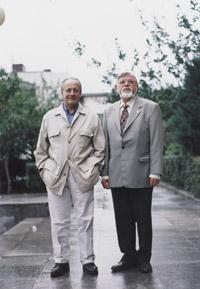Erhard W.Fischer: a life dedicated to research

Where is the key to the appointment of doctor honoris causa? Be an exceptional science man or choose a research topic?
I don't think it's for so much. It is not like receiving the Nobel Prize or similar. About forty years ago I started researching and from the beginning I studied the physical properties of polymers. I was lucky to make some discoveries. I was the planning director of the Max Planck Institute from 1983 and most of the research there was related to polymers. I have had very good collaborators and students in the environment, so much of the success comes from them.
You have seen from practically the beginning the development of the polymer industry. Have you met Dr. Flory, so prestigious in physical polymer chemistry?
Yes, of course, we have joint projects, when in the seventies he worked at the University of San José.
Polymers are present in all areas of the chemical industry. They control our world.
Yes, the development of the polymer has meant the solution of a series of problems that conventional materials do not offer. Therefore, the so-called functional polymers are the ones that receive the most attention, such as those that are conductors of antibodies or light emitters, those that serve to build television screens, etc. However, polymer chemistry focuses on reducing material costs.
Is there a great tendency to model natural polymers?
Yes, of course. Current science is making an increasing effort to understand structure, function, etc. of biological macromolecules, making them an ideal model for the synthesis of new macromolecules.
You have analyzed the crystallization processes in polymers. Can that bring ideas about what happens in simpler materials?
No. We have tried to clarify the crystallization standards for application in our polymers. But because they are such complex molecules, transport problems arise and the extension of the crystal branches is difficult. This problem does not exist in small molecules. Therefore, I don't think polymer crystallization can help understand other crystallizations. Although in general the scheme is the same, the physics of polymers is very special.

Street people look for simple information that says things are good or bad. Is your kind of work far from the people?
It's a good question. We always have the ecological point of view, both in metal and polymer research and in any other subject. We must also think about the consequences. For example, in the problem of PVC you have to understand that if treated well there is no danger. You'd be surprised that you knew the number of things it used! Ultimately it becomes a commercial problem.
When did you start collaborating with the university teams here?
We didn't start long ago, it was the first time in 1987. At a congress organized here there was a symposium on polymers, so I met Professor Colmenero and together we started a project. Some of our researchers came here and went to Mainz. We also participated jointly in a European project.
What do you think about the research done here?
I don't know any other group here, but as far as I've known I think there is a very high level of research here. It is very specialized. I also know another group studying polymers in Madrid.
To conclude the question about the work done at the IUPAC (International Union of Pure and Applied Chemistry). How is work in such a large institution?
IUPAC is responsible for all types of chemicals, with many committees responding to various objectives. It also has sub-commissions. In one of them, when dealing with macromolecules, I worked. Above all, we were in charge of standardizing measurement methods, characterization procedures, etc. for all territories.
Buletina
Bidali zure helbide elektronikoa eta jaso asteroko buletina zure sarrera-ontzian











